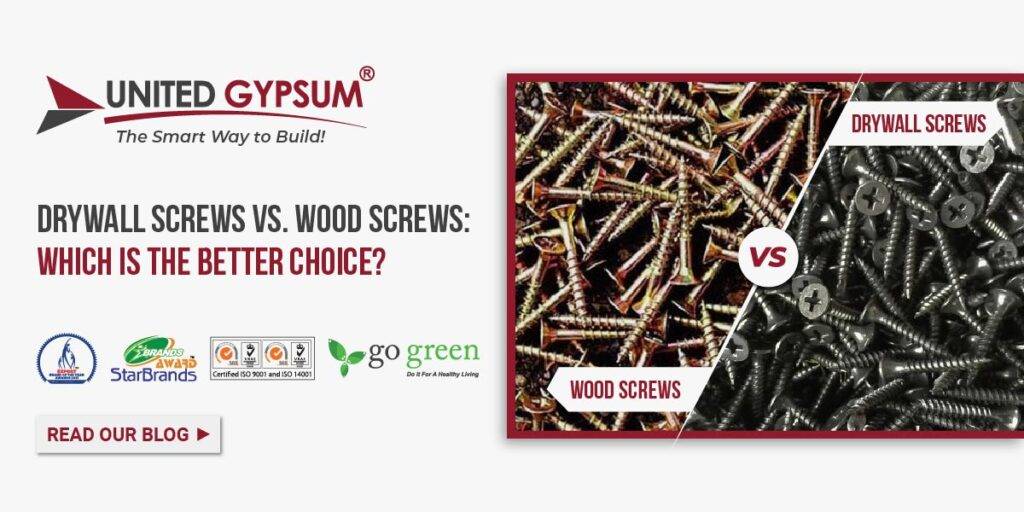Drywall screws are specifically designed screws intended for securing drywall panels to frame studs. They are designed with features that make them fit for this particular application. Drywall screws are typically composed of hardened steel providing strength and longevity. They don’t require pre-drilling holes due to their sharp, self-drilling tip, which makes it easy for them to pierce drywall. Furthermore, the threaded shaft of drywall screws provides them a strong grip on the drywall and aids in securing it to the frame studs. To accommodate varied wall thicknesses, stud materials, and specific project needs, they are available in a variety of lengths, thicknesses, and thread patterns.
Selecting the appropriate screws for gypsum board installation is essential to guarantee a stable and long-lasting finish. With an overwhelming range of choices available, identifying the appropriate drywall screws for your project can be an uphill battle. To make this process simpler, we’ve compiled a list of crucial instructions to help you make informed choices and accomplish professional outcomes.
What are Drywall Screws?
As the name implies, drywall screws are mostly used for installing gypsum boards or plasterboards on wall surfaces. They feature an extremely fine thread and a sharp edge that allows them to self-pierce the drywall material. Since they are composed of hardened steel, drywall screws typically have a grey or black phosphate coating on them to mitigate corrosion. To accommodate varied drywall thicknesses, they come in a variety of lengths and diameters.
What are Wood Screws?
On the flip side, wood screws are made especially for woodworking applications. Their coarser thread offers them a greater grip and holding force for interacting with wood. Typically, brass, stainless steel, or steel with an ornamental finish are used to make wood screws. Their pointed tip facilitates a smoother and simpler penetration into the wood. In similarity with drywall screws, wood screws are available in an abundance of thicknesses and lengths to accommodate a variety of woodwork projects.
Drywall Screws vs. Wood Screws
Now that we’ve established the fundamental distinctions, let’s compare drywall screws and wood screws in greater depth.
1. Strength & Holding Power
The holding power of a screw is an important consideration when choosing any type of screw. Wood screws often perform more effectively than drywall screws in terms of sheer strength. Their coarser threads provide an even better grip, which makes them perfect for securing heavy weights and wood joints. Nevertheless, drywall screws offer enough holding force to hang drywall sheets because these screws have been designed specifically for plasterboard applications.
2. Ease of Insertion
Screw insertion into timber wood can at times be daunting. Wooden screws are more straightforward to begin the installation without pre-drilling holes due to their coarser threads and pointy edges. On the other hand, pre-drilling is usually necessary for drywall screws since their sharp edges might fracture the gypsum board when installed straight away. The installation procedure may take longer with this additional phase, particularly for construction tasks that require an abundance of screws.
3. Finish and Aesthetics
Aesthetics are important throughout architecture and interior design. When aesthetics is significant, wood screws are frequently employed for home furnishings, carpentry projects, and exposed locations. These screws include ornamental finishes, such as brass or brushed stainless steel, that elevate the project’s overall aesthetic and contribute an element of refinement. When it comes to concealed drywall panel attachments where aesthetics isn’t a major consideration, drywall screws are perfect because of their utilitarian appearance with a plain or black phosphate coating.
4. Resistance to Corrosion
In outdoor or very humid conditions, the longevity of screws becomes critical. For outdoor or moisture-prone environments, brass or stainless-steel wood screws provide exceptional resistance to corrosion, guaranteeing long-term endurance. On the other hand, inadequately coated drywall screws are vulnerable to corrosion, which makes them unfit for applications in moist environments.
5. Versatility
Wood screws are exceptionally versatile since they are compatible with a wide range of wood types, including plywood, MDF, hardwoods, and softwoods. On the other hand, drywall screws are solely suitable for drywall-related tasks since they have been developed specifically for fastening drywall.
6. Cost
Cost is a key consideration in each and every venture. On the whole, drywall screws are more economical than wood screws. They are extensively accessible and abundant, thus rendering them ideal for large-scale utilization. Wood screws are often more costly since they are more specialized and often constructed of more expensive supplies.
Ending Remarks
In summary, the type of project will eventually determine whether to use wooden or plasterboard screws. Choosing drywall screws is a pragmatic decision-making when working on drywall installation projects as a result of its affordability and suitability. However, wood screws are the more appropriate option if you’ll be working on woodworking projects like furnishings or cabinets due to their exceptional strength, appealing look, and resistance to corrosion.
When choosing the right screws, always keep your project’s specific requirements in mind, including the material and environmental factors. For any woodworking or drywall project, you can ensure an effective and durable outcome by carefully evaluating the pros as well as cons of woodscrews and drywall screws.

